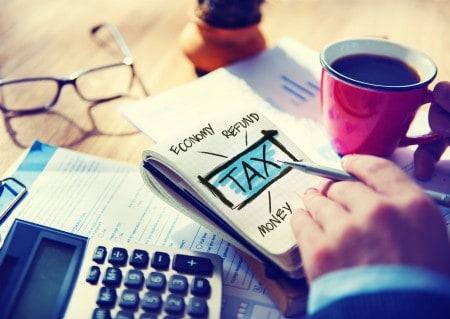
Tax Update – November 2015
Unbundling phone and internet expense claims for work purposes

Individuals can claim deductions for mobile, home phone and internet expenses that have been incurred for work purposes, however, correct apportionment for work use is a key issue. According to the Australian Tax Office (ATO), as there are many different types of plans available, taxpayers need to determine their work use using a reasonable basis.
Phone and internet services are often bundled: when a taxpayer is claiming deductions for work-related use of one or more services, they need to apportion their costs based on their work use for each service. If other household members also use the services, the taxpayer needs to take into account that use in their calculations.
TIP: If the taxpayer has a bundled plan, the ATO says they can identify their work use for each service over a four-week representative period during the income year. This will allow the taxpayer to determine their pattern of work use, which can then be applied to the full year. Please contact our office for assistance.
Student loan debt recovery from overseas
As part of the 2015 Federal Budget, the Government announced that Australians living and working overseas who have a Higher Education Loan Program (HELP) or Trade Support Loan (TSL) debt would soon be required to repay that debt in line with the obligations that apply for debtors who live and work in Australia.
The repayment obligations are expected to apply from 1 July 2017, based on income earned in the 2016–2017 financial year. The repayment obligations would only commence once the individual’s income reached the minimum repayment threshold. People heading overseas for more than six months would be required to register with the ATO, while those already overseas would have until 1 July 2017 to register.
TIP: The Government is intending to facilitate reciprocal arrangements with foreign governments; to share details of individuals to allow foreign governments to identify if their citizens with student loan debts are living and working here in Australia. At this stage New Zealand and the UK have been flagged for reciprocal arrangements.
TIP: Individuals can make voluntary repayments at any time to reduce their HELP debts. Currently, if you make a voluntary HELP repayment of $500 or more, you get a 5% bonus. If your HELP debt balance is less than $500 and you make a voluntary repayment to pay out the debt, you also get a 5% bonus. Voluntary payments are in addition to compulsory repayments. Any voluntary repayments you make are not tax deductible.
SMSF trustees warned to plan for cognitive decline
Noting that dementia is on the incline, the ATO have highlighted the issue of cognitive decline and that it is important for trustees of self managed superannuation funds (SMSFs) to have plans to ensure that financial matters will be effectively managed, if and when trustees no longer have the capacity to manage their funds.
“SMSFs are in reality usually managed by one trustee and require a high level of financial decision-making. While many trustees remain perfectly capable of effectively managing their financial affairs well past retirement age, there is a risk that some with diminished capacity to effectively manage their fund may nevertheless continue to do so. Most don’t have a plan for what to do if they get to this point”, said Kasey Macfarlane, ATO Assistant Commissioner, SMSF Segment, Superannuation.
In this regard, Ms Macfarlane said, it was essential that trustees “agree in advance about decision points and exit decisions, to have a will and appoint an enduring guardian and power of attorney”.
Tax debt release application refused

The Administrative Appeals Tribunal (AAT) has refused a couple’s application to be released from their tax debts after finding the couple (the taxpayers) would not suffer serious hardship if they were required to satisfy the liability. The tax debt the taxpayers sought to have released amounted to some $25,000. The taxpayers argued they should be released from the tax debts because their financial position was due to ‘serious family difficulties and problems’, which had distracted them from their tax affairs.
Although the AAT was sympathetic towards to the taxpayers, it concluded they had not discharged the onus of proving that they would suffer serious hardship if they were required to pay the relevant tax debts. The AAT reached this conclusion after calculating the taypayers’ fortnightly income and expenses. In this regard, the AAT noted the taxpayers were making more than the required minimum mortgage repayments and could draw down on their home loan.
Even if it were a case of serious hardship, the AAT said, it would not exercise the discretion to waive the debt. Among other things, the AAT noted that one of the taxpayers was a beneficiary in the estate of her mother and stood to receive approximately $200,000.
TIP: Serious hardship exists when payment of a tax debt would leave you unable to provide for basic living necessities for yourself and dependants. The Tax Commissioner has the discretion to release you from eligible tax debts; however, even if the Commissioner is satisfied that serious hardship would result from payment of the tax debt, he is not obliged to exercise the discretion in your favour.
Retiring partner’s individual interest in net income of partnership
According to a recent ATO Taxation Determination, where a retiring partner receives an amount representing his or her individual interest in the partnership net income, that amount is assessable under section 92 of the Income Tax Assessment Act 1936. This is the case even if the partner retires before the end of the income year or the payment is received in a subsequent income year. Furthermore, the way the payment is labelled or described will not change the ATO’s conclusion that the receipt represents the partner’s share of partnership net income and needs to be brought to account under section 92.
The ATO notes that a partner’s individual interest in the net income of a partnership is essentially a question of fact in each case, to be determined by reference to the partnership agreement, the partnership’s accounting records and any other relevant documents. The ATO notes that its approach in the Determination is a departure from several private rulings, in which it took such receipts into account under the capital gains tax (CGT) rules. The ATO says that an amount representing an individual interest in partnership net income may also represent capital proceeds from a CGT event; however, any capital gain that would otherwise arise is reduced to the extent that it is assessable under other provisions.
TIP: The Taxation Determination applies to assessments made after 3 June 2015. The ATO says it will not seek to disturb favourable assessments made before that date.
ATO targeting ride-sourcing drivers and eBay online sellers
The ATO has announced that it will acquiring details of ride-sourcing drivers from ride-sourcing facilitators by matching data electronically with ATO data holdings to identify people. The aim of the data-match is to identify taxpayers that can be provided with tailored information to help them meet their tax obligations, or to ensure their compliance with the tax law. The ATO estimated that records relating to between 10,000 and 15,000 individuals will be matched.
TIP: The ATO has affirmed that people who provide ride-sourcing services are providing ‘taxi travel’ under the GST law. The ATO has previously advised that it expects all drivers involved in providing ride-sourcing services to be registered for goods and services tax (GST). Please contact our office for information and assistance.
The ATO is also acquiring online selling data from eBay relating to registrants who sold goods and services to a value of $10,000 or more during the period 1 July 2014 to 30 June 2015. The data requested includes information that will enable the ATO to match online selling accounts to taxpayers, including names, addresses and contact information, as well as information on the number and value of transactions processed for each online selling account. It is estimated that records relating to between 15,000 and 25,000 individuals will be matched.


